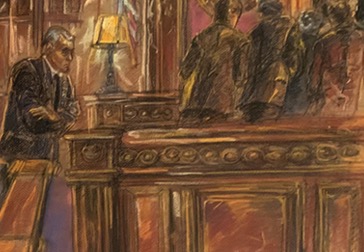Fort Lauderdale Federal Crime FAQs
Federal criminal law is a unique area of the law, with special rules and procedures you may be unfamiliar with. Fort Lauderdale criminal defense attorney Bruce L. Udolf has decades of experience in federal criminal law in South Florida, both as a federal prosecutor and as a criminal defense lawyer. Below are answers to frequently asked questions about federal search warrants, grand juries, plea agreements and other important aspects of federal criminal law. If you have additional questions, or if you have been arrested or investigated for federal drug charges, white collar crimes or other federal offenses, call Bruce L. Udolf, P.A., for a consultation.
Q. Do I have to let federal agents search me, my home or car?
A. The Fourth Amendment to the U.S. Constitution requires that all searches be reasonable. A warrant is required in most instances, and the agents must generally have probable cause to search. The courts have recognized a number of exceptions to the warrant requirement, so it can be confusing to know what to do when the police want to search you or your belongings. If the federal officers present a warrant, you should not try to interfere with their search. If the warrant turns out to be invalid or improperly executed, your attorney can fight to have any evidence excluded from court.
If the search is warrantless but the police nevertheless demand to search, trying to stop them could lead to a charge of obstruction of justice or resisting arrest. They may have a valid exception to the warrant requirement. Again, your lawyer can address the situation after the fact if they searched when they shouldn’t have.
One thing to be aware of is that if the agents ask your permission to search you or your vehicle or come into your home, you don’t have to let them. They can search you with your consent, but if they don’t otherwise have grounds to demand a search, you don’t have to permit them. Federal agents may make it seem like cooperating is in your best interests, but this is rarely the case. In most instances, the better course is to decline consent to a search, at least until you have spoken with an experienced federal criminal law defense attorney.
Q. What is a target letter?
A. A target letter is the U.S. Attorney’s way of letting you know you are the target of a grand jury investigation. The letter may invite you to testify in front of the grand jury, or it may ask you to come to the U.S. Attorney’s office to answer questions. Sometimes a target letter will ask you to have your attorney call the prosecutor’s office. Regardless of what the target letter requests of you, your first action should be to immediately contact an experienced federal criminal law defense attorney who can advise you on how to respond.
Q. What happens in a grand jury?
A. A grand jury listens to testimony and reviews evidence brought in by the prosecutor and decides whether to hand down an indictment, which is necessary to initiate a prosecution of any federal felony offense. If called to the grand jury, you will be asked to testify and/or produce documents or records. It is hard to know if you are being called as a witness to a crime, a subject who may have knowledge of a crime being investigated, or the target of the investigation. Your attorney may be able to discern the nature of the grand jury proceeding based on whether you received a subpoena or a target letter, or by communicating with the U.S. Attorney’s Office.
Once in the grand jury room, you won’t have the advice of counsel. Your attorney can prepare you and advise you before you go in, and before you answer a question, you may request to step outside and confer with your lawyer. Your ability to refuse to answer questions in a grand jury proceeding may be limited, so it’s important to visit with an attorney beforehand so you know how best to proceed.
Q. How does immunity work?
A. If you are summoned to a grand jury or asked to cooperate with federal agents in their investigation, you may want to negotiate immunity in exchange for your testimony or cooperation. There are different types of immunity, such as Use Immunity, Derivative Use Immunity and Transactional/Blanket Immunity. Unless you fully understand what type of immunity is granted, you could wind up incriminating yourself and be prosecuted for a federal criminal offense. Let your attorney negotiate a grant of immunity for you and explain what it means to you before you agree to cooperate.







